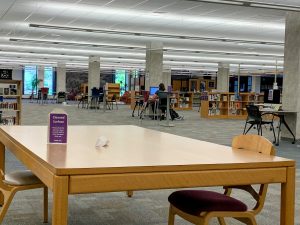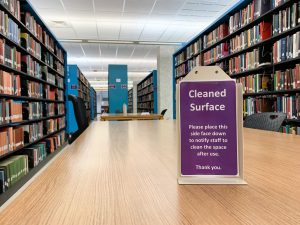As the COVID-19 pandemic made its way around the world and left everyone in a state of quarantine, many individuals have changed their ways of living to help slow down the spread of the virus. Specifically, many colleges around the world have altered their institution from in-person classes to a virtual environment.
“Our world turned upside down last spring at the drop of a hat so everyone had to find new ways of connecting, doing school and work,” said Alisa Thompson, a counselor at University Health and Counseling Services (UHCS) on the University of Wisconsin-Whitewater (UW-W) campus.
This change also includes a variety of aspects within the college experience such as sports, extracurricular activities, employment, internships and more. With this sudden modification of college life, many students were left feeling isolated and experiencing an increased level of stress.
“As a student, I think my mental health has been affected because of the isolation that the pandemic brought. Not having people around as much has really forced me to be alone with my thoughts and that’s not really the healthiest when you are not in a good mental headspace,” said Hannah Agustin, a junior at UW-W.
Some stressors within college students that have increased due to the pandemic include financial concerns, going to school in a different environment and more.
“I think that there could be a ton of factors that could impact mental health depending on the student’s unique circumstances,” said Dr. Amy Barth, assistant professor at UW-W and clinical coordinator at Winther Counseling Services. “There may have been financial stress if students have lost jobs during the pandemic or when dorms closed last year and you [students] weren’t planning to move back for two monthes.”
Active Minds, a nonprofit organization focused on raising awareness about mental health within college students, conducted a survey that included responses from over 2,000 college students about how the COVID-19 pandemic affected their mental health. Some of the most common ways that the pandemic has impacted students’ lives include stress, anxiety, loneliness, financial setback and relocation.
“One of the challenges that we’ve been hearing about is financial insecurity. Along with that, I would say the loss of social circles and mourning the loss of graduations, sporting events or any other extracurricular activities has been really challenging,” said Kelly Madden, the chapter coordinator for Active Minds.
The findings from the Active Minds survey have also been related to the academic performance of college students during the pandemic.
“Another thing that we found in our Active Minds survey is that a lot of students struggled with focusing [on academics] and being in the same place all the time,” said Benjamin Heim, a program intern for Active Minds. “When you’re in your bedroom all the time, you relax and work in the same place so it’s hard to separate those things in your life.”
To help cope with the mental stresses that college students have experienced during the pandemic, many have turned to counseling centers and resources that help aid in mental health. Thompson says that she has seen an increase in students utilizing counseling services since the beginning of the pandemic.
“I would say that, anecdotally, it seems that we have seen an increase in demand for services normally during a time where we would have less students seeking services such as summer break and winter break,” said Thompson.
With the increase of students seeking counseling services and complying with COVID-19 mandates, UHCS has used online resources to help meet with as many students as possible.
“With the increased capabilities of meeting students through phone or video counseling, we have seen an increase in demand for services,” said Thompson.
Through her experiences talking with students during the pandemic, Thompson shares that the weight of the pandemic has negatively impacted students’ mental health.
“For folks that were already experiencing symptoms of depression or anxiety, I think that those things have gotten worse for a lot of folks because of all the different things that relate to the pandemic,” said Thompson.

Students at the University of Wisconsin-Whitewater study in the Andersen Library to get their work done. 
The Mary Poppe Chrisman Success Center, connected to Laurentide Hall, on the University of Wisconsin-Whitewater campus is a resource that students can use for tutoring purposes. 
Every table and desk within the Andersen Library is provided with a tabletop sign to indicate if the space has been cleaned to ensure COVID safety. 
The Ambrose Health Center on the University of Wisconsin-Whitewater campus is where University Health and Counseling Services can be found.
Academically, the pandemic has taken away many in-person interactions from students that can be beneficial in their learning experiences.
“For language classes, in particular, it’s a lot better when you have in-person interactions with the professor and I didn’t get to have that opportunity anymore [after in-person classes moved remote],” said CJ Hoze, a junior at UW-W. “I didn’t feel like I was getting the highest quality education that I paid for at the institution.”
Being able to participate in class discussions and receive insight from other students has been a different experience for Agustin while taking courses during the pandemic.
“Because I’m an english and film major, a bulk of things I learn come from discussions and discourse with my classmates. I missed that during the pandemic because even though I watch lecture videos, I’m not able to see into the headspace of my classmates and that really helps you become a better critic and become more well-rounded in your views,” said Agustin.
On the other hand, college students have also learned and adapted new skills through virtual learning and the environment that the pandemic has put them in.
“I think the pandemic made me become more disciplined and to really monitor my workload without the supervision of someone else. It helped me become better at time management,” said Agustin. “I know that online classes aren’t the best way to learn, but I think that it instilled a different kind of discipline that allowed me to become more aware of my time.”
Counseling, and other forms of aiding mental health, has been a widely used tool for college students while they have been facing the struggles and uncertainties of schooling through a pandemic. Though some students may feel hesitant about going to counseling sessions, counselors still continue welcoming students to utilize their services and talk about their mental health.
“I encourage anybody who’s interested in wanting to explore a little bit more to come in and give counseling a try,” said Barth. “It really is a dialogue between the client and the counselor and focusing on whatever would be beneficial to the client to focus on in their time together.”
May 17, 2021 at 7:10 pm
Nice use of multimedia. Thanks.
June 2, 2021 at 10:07 am
Thanks for sharing this Ben. You have covered the really great.
July 13, 2021 at 10:03 am
nice topic, keep give us any information
thanksss
http://mpsi.uma.ac.id/
July 31, 2021 at 4:47 pm
Ben, Glad to visiting your blog. This was a really difficult period of time for all of us and social media helped us a lot to stay connected and safe!
September 11, 2021 at 7:03 am
It’s a real eye-opener. You wouldn’t expect stress and depression to be linked with NOT having to go to classes.
But it’s understandable. Not everybody is happy to spend all their days playing video games or binge-watching Netflix. There are many who need their outdoor lives to maintain a healthy mind.
The one thing I noticed is that studying from home is actually so much harder than studying in school. You have to be more disciplined. Be motivated. Organize your time. Plan out your studies. It can be super overwhelming!
And why do we still always feel so tired even though we’ve been lounging on the couch all day??